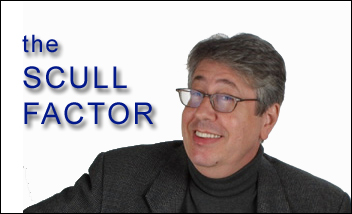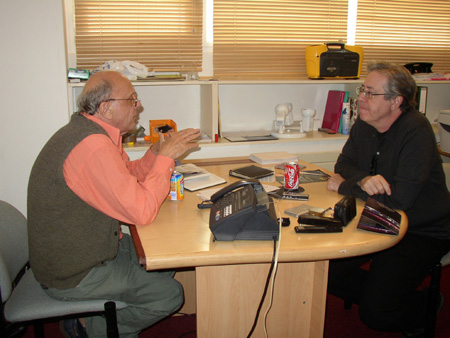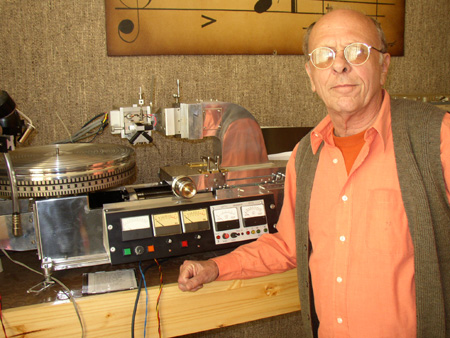|
You are reading the older HTML site Positive Feedback ISSUE 12march/april 2004
J-10 Visits David Manley During a trip to visit Kathleen's brother Pierre and his fiancée Carine in Paris, I tracked down David Manley of Marwan Manley Mastering and arranged a date for an interview. I've known David for a long while, and have an enduring relationship with Luke Manley, his son, and wife/partner Bea.
David's atelier, which he opened in the summer of ‘03, is located in the 12th arrondissement, tucked away on a quiet, sunny street. After a warm welcome and introductions to David's partner Marwan Danoun, David took us on the Grand Tour. The mixing/mastering room is a marvel of modern technology and equipment. The main board is all latest-spec Siemens, and the sound was terrific. Afterwards, we sat down for a chin-wag. I whipped out my digital recorder and started by calling him a legend in the business. "Is that right?" he replied, completely pie-faced.
Jonathan Scull: David, what's the quick take on your background? David Manley: Well, I got the equivalent of a university degree at the London Polytechnic and immediately apprenticed at EMI. So I became a recording engineer for the next 30 years. J-10: Why do you mix and master, David? DM: Well, yes, we do both. Typically people like me just do mastering with something like ProTools. I can't speak for other mastering houses outside Paris, but very few of them here do the mixing as well. Normally they work with a live mix and that's what gets mastered. Even with a guy like Bob Ludwig, one of the greatest engineers around, they only do him the honor of two or three takes and let him choose the best one. Mixing here saves a lot of generational problems when you do it really well.
Marwan Danoun at the controls J-10: Let's jump right into the audiophile hot tub, if you don't mind. And from what I hear tell, you won't mind at all. You're, ah, only slightly ballistic about SACD? What's the problem with it? Many like its sound, including me… DM: SACD isn't much interest to me at all. Sony/Philips is trying to sell us a bill of goods, and I'm not buying it. What have you got there, after all? It's just Delta-Sigma by another name—The point is, it's still only 1-bit! You still get the same crappy converters as offered in cheap portables or average car systems. J-10: [stammering] Er, well… DM: Don't forget that Sony and Philips told us the first CDs were "perfect sound forever", and now they're saying that 1-bit multichannel SACD is the ultimate stuff, even with those nasty, 1-bit off-the-shelf converters. So, what I'd like to know is what, if anything at all, is different now then back when 1-bit was introduced? J-10: Have you actually heard SACD David? DM: I have, and I found it totally underwhelming. I've heard people who I think should know better saying SACD is very close to analog and pleasing to the ear. Well, in my opinion—and there are a lot of like-minded individuals—a good multibit PCM D-to-A converter is regarded as the best ways to listen to digital music. J-10: Because of Sony's single-bit converters? DM: Listen, DSD is noisy, six times noisier than one-bit players. Why, that's not anything like the noise floor you find in good 20-bit PCM converters, where the noise is down about -114db. To have minus 114db and compare that with DSD's 18-bit noise-shaping with perhaps an 80k apparent or equivalent sampling rate is ridiculous. I mean, why bother? J-10: So the comparison is bogus? DM: The point is we have to compare SACD to what you'd expect to hear on a good quality multibit PCM machine. And there are many fine PCM converters out there, like from Meitner, dCS and Prism, for example. Or take Dan Lavry at Lavry Engineering in Seattle—he used to be DB Technologies – he makes arguably the best converter in the world. And Weiss Engineering in Switzerland makes great converters too. These are the hot guys, so my comparison with SACD is based on these extremely good multibit PCM converters. Even if they have to be multiplexed to 24/96, you still have to come down to 16 bits to put it on a Red Book CD, but at least we get all 16 bits this way. And those single-bit DSD converters just don't stand up. J-10: You believe there's no hope for the future of DSD? DM: Well… the next step, they say, with SACD is providing digital outputs so better converters can be used. That'll make mastering easier. But in the PCM world they already have great tools to work with. Right now, if you try to master with SACD, all we can do is change the levels somewhat, or bring it back into the analog domain to work on. That's why you get these really bad 8- or 12-bit recordings, with few albums actually recorded for SACD. J-10: Well, perhaps we haven't heard enough "native" SACD recordings, just older 2-channel master tapes or PCM masters that are converted to DSD? DM: Exactly! That's one of the problems with SACD—there's very little actually 2- or 6-channel material recorded with SACD in mind. You wind up mixing technologies and get rubbish, a bunch of material taken from older tapes and transferred in analog creating an unhappy mélange. J-10: On the pro-side, has Sony/Philips done anything to encourage more new recordings in DSD? DM: Actually yes. They co-sponsor mastering and do everything possible to get small labels to release SACDs. But I've got hundred of titles to my name, there's no way can I afford that. You're aware that it's a frightening expense to master in 6-channel, so they sponsor it and make a double-layer disc—CD and SACD—to promote hybrid discs. J-10: Well, that seems like a step in the right direction… DM: You think so? It helps with the cost but does nothing for the sound, I can tell you. All the medium size labels like Chesky, if you like, can't give SACDs away. J-10: So you're a 2-channel stalwart… DM: Just this past weekend I was in Milan, and I spent time with a label I do work for called Fonè. (http://www.fone.it) I know them for a long time, they're very purist and make wonderful recordings of mainly Italian music. I heard their discs and others in stereo and multichannel on a variety of systems including at least a dozen surround front-ends. I have to say, I was more impressed each and every time with the 2-channel stuff. Remember when comparing 2- or 6-channel DSD and 2-channel PCM CD, you're hearing the common denominator of sound produced by the converters. People lose sight of that, or never thought of it in the first place! J-10: Why don't others see the problem? DM: That what I'd like to know! No one in the magazines tries to address the real technical underpinnings of DSD, no one calls a spade a spade. They just repeat back what Sony tells them. Why should I go around espousing 6-channel DSD systems that don't even use decent converters? And if single-bit is so good now, how come my 1-bit player from ten years ago is easily blown away by a hot multibit PCM converter? J-10: So the magazines have some culpability you feel? DM: Hah! I'd like to see a consensus of so-called opinion-making golden ear types say that SACD—single-bit stereo—is positively superior to multibit PCM stereo. And I don't see that anywhere! Instead all I hear is fluff about SACD sounding like analog! Well, what analog would that be? The inside grooves of an LP, the master tape? I mean, the outer grooves of an LP can be phenomenal sounding, the peripheral speed decaying near the label, which is part of the problem with vinyl. J-10: And… DM: I'm not done yet! [laughs] The magazines also have to review more the more affordable stuff—like NAD and Rotel. They can't keep talking about $28k CD players, $30k phono preamps, and such. It's beyond madness! We have to open up the hobby. Imagine if that had been done years ago, maybe downloaders wouldn't appear in such large numbers. J-10: So you're suggesting downloading is the major problem with the business these days? DM: Nah, I don't think the major problem is downloading. Lots of people buy albums after they've listened to one or two tracks on their computer. A major problem is the price of discs; they're just too high! Here in Europe, figure around $25 dollars, or 16 Euros. That's a lot of money. And buyers aren't interested in buying an album for one or two good tracks; those may be your downloaders. J-10: If not downloading, then what accounts for today's sorry state of affairs. DM: Well, there's way too much bad content out there, just really poor music! One guy said to me: Isn't a pity that the record business isn't done just for personal consideration, not money… J-10: Sounds like a cutline to me! DM: The content is just not there, in spite of new Rolling Stones and Beatles releases. J-10: Is it any different here in France? DM: Well here you can go to a record bar and listen on headphones or in a booth before buying. J-10: That is very, very cool. Your thoughts on Mpeg? DM: I've listened to Mpegs and they're terrible! I just can't stand it, and that's not just me being a snob. It's bloody awful. J-10: Hear hear, as it were… So who's doing things right, in your opinion? DM: The guy who interests me is Chad Kassem at Acoustic Sound. He told me he can't give away multichannel recordings, there's just no call for them. But he's got a mastering room and pressing plant and he's also no doubt taking advantage of Sony's free mastering offers, but even that's pretty cynical. Sony is doing it because they want content, and they can't seem to get it from the big labels. J-10: Have you heard anything in multichannel that sounds good to you? DM: Well, I recently heard Simon Rattle's recording of a Bruckner symphony freshly recorded in 6-channel DVD-A and it was stunning, absolutely stunning. I dunno, I still can't see multichannel music taking hold with audiophiles the way 2-channel has. J-10: Why is that? DM: Because 2-channel is what audiophiles are used to listening to, what their collection is based on. I think 2-channel is musicologicaly all you need. You can derive the subwoofer signal if you need it, but all that's required for fine musical reproduction is two channels. Anyway, the idea of having to buy five $20k speakers plus a sub is ridiculous. J-10: Do you think DVD-A will succeed? DM: Not especially in the audiophile sector. DVD-A will succeed however, in my view, in the mass-market as DVD Video has such a large installed base. However, DVD is for pictures, and I don't know if these are gonna be the guys who go out and buy symphonies without any pictures! But because of big sales, there's a better chance to grow music lovers that might buy into audio-only systems.
J-10: Tell me about some of the great equipment you've got stashed here… DM: Well, upstairs there's a Telefunken 24-track recorder, with another Tele 16-track downstairs. It's great, in'it? You can move the headstacks from one machine to the other as both have 24-track electronics. And I've got a Studer mixing board downstairs as well.
J-10: And the gorgeous vinyl cutting rig?
DM: The lathe? Well, as you know, there's been a big upsurge in vinyl. I've even heard it said by some audiophiles that they don't need another high-resolution system as they've already got LP! I don't really go on with that, but anyway, vinyl is vinyl. J-10: Ah-hah! Pray continue… DM: You can't buy a lathe off the shelf, they're like racing cars, so you start with the "chassis." This machine is built up on a Scully "bed," as it's called—the slide cradle holding the head is far superior to any other built. And it's got a Neumann head, an older model, the SX68 rather than the SX74, as the '68 handles a lot of current and puts more level on the disk. The platter's a Neumann as the Scully platter tends to ring like a bell! And I made the motor and power supply, of course.
J-10: Of course! Ummm, was that a belt-drive platter? Isn't that rather unusual? DM: True, ninety-nine out of a hundred LPs have been cut by a direct drive motor, but in the audiophile world it's not kosher to play an LP on a direct-drive table, hah! But this is a belt-drive lathe, my friend, and that should make everyone happy.
J-10: I'm feeling warm and fuzzy all over. Uh, what kind of setup do you have at home, David? DM: Veronique (David's long-suffering better half) and I have a home theater setup in the bedroom, with front left and right speakers, which is more than enough. Especially here in Paris, where the idea of giving up a whole room to a home theater system isn't bloody likely at all. You've got mostly small 10 or 12 square meter flats, so can you imagine gigantic or even medium-sized home theater systems in these flats with only something like 300 square feet available? And we have a nice, musical 2-channel system as you might guess, Mr. Scull! J-10: Well, thanks David, it's been great catching up with you. DM: You're welcome! Let's round up Kathleen, Pierre, Carine, and head over to my place, you'll meet Veronique, and we'll have dinner. J-10: David, I am right behind you, my friend! David can be reached at:
Marwan Manley Mastering
|










